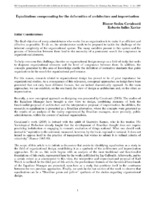Equalization: compensating for the deformities of architecture and improvisation

View/
Date
2007-10Author
Cavalcanti, Bianor Scelza
Xavier, Roberto Salles
Metadata
Show full item recordAbstract
Theories on organizational design emerge as a field of studies that endeavors to diagnose organizational elements and the level of congruence between them. In addition to this, the concepts generated by this area of knowledge enable the definition of normative standards that guide organizations in the search for organizational performance. At present, the conceptual approaches to design that have been presented not only have different focuses, but are indeed diametrically opposed. The main approaches can be established as, on the one hand, the view of design as architecture and, on the other, as improvisation. Recently, the studies of the Equalizer Manager have brought a new view to design, combining elements of both the functionalist proposal of architecture and the interpretative proposal of improvisation. The scope of this article is to initiate a discussion that assists in identifying equalization as a study in the field of organizational design, establishing it as a "Brazilian green and yellow" synthesis of the architecture and improvisation approaches.

